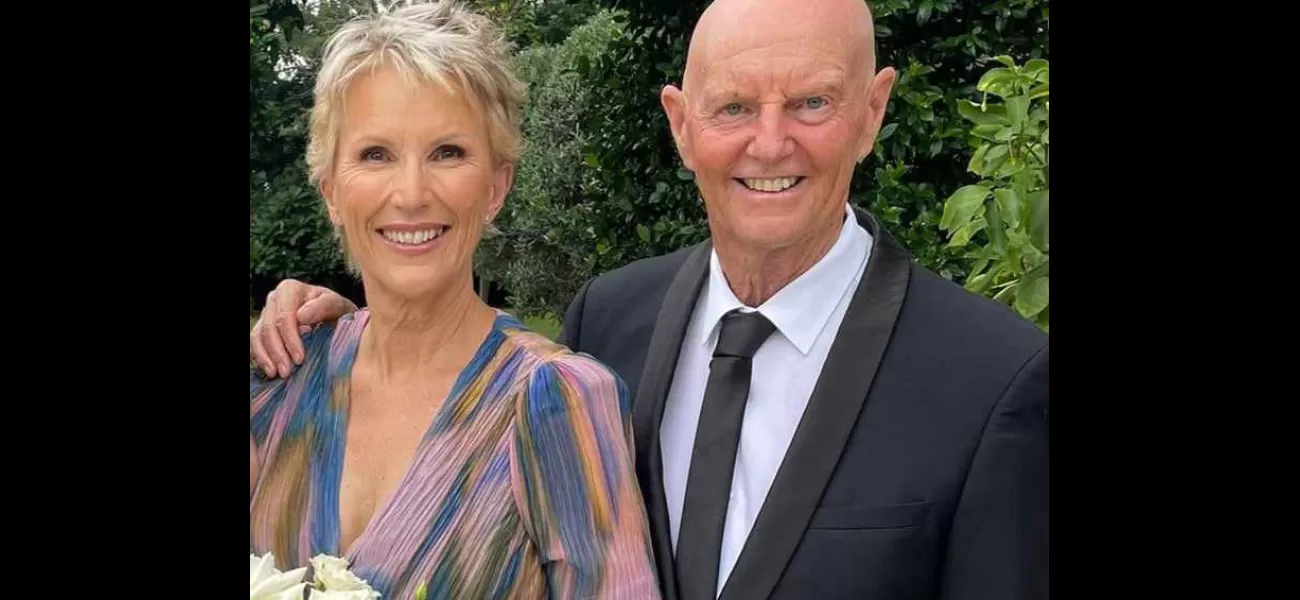I was fortunate to lie next to him, and it was a beautiful experience.
> Marshall, along with over 2,400 other Australians, have utilized recent laws to legalize assisted dying.
August 14th 2024.

Di Hall reflects on her husband Marshall's passing as a "beautiful" one. After being diagnosed with terminal cancer and experiencing excruciating pain, Marshall made the decision to utilize Australia's voluntary assisted dying laws to end his life. On September 1, 2023, at the comfort of their home on the Gold Coast, the 61-year-old peacefully passed away. Di, who is now 63 years old, considers herself lucky to have been able to stay by her husband's side during his final moments.
As a fit and active surfer who worked as a real estate agent before his illness, Marshall was a typical example of the 2,467 Australians who have utilized the legalized assisted dying laws, according to a recent report. It all started when he began experiencing constipation and a pain near his tailbone, which eventually led to a diagnosis of presacral tumour. As the cancer progressed, sitting became impossible for Marshall due to the location of the tumour.
"The worst part of it all was that his pain was never manageable," recalls Di, who is also a nurse. "He couldn't even enjoy a simple cup of coffee, all he could do was lay in bed." The pain and discomfort became unbearable for Marshall, and his biggest fear was losing control over his own body.
After going through the necessary process to obtain permission for assisted dying, Marshall was able to say goodbye to his loved ones through a "living wake," as described by Di. On the day of his chosen passing, Di prepared the drugs herself and stayed by Marshall's side as he peacefully departed after consuming them. For Di, the whole process was about giving back Marshall's control, dignity, and the ability to make his own decisions.
A recent report by the charity Go Gentle Australia, founded by broadcaster Andrew Denton, titled "State of VAD," sheds light on how the voluntary assisted dying laws are working in Australia. CEO Dr. Linda Swan states that the data from 2019, when the first state (Victoria) legalized assisted dying, is "reassuring." She further adds, "The State of VAD is overwhelmingly a good news story. None of the negative predictions made by opponents have come true, and the system is functioning safely and with great compassion."
However, the charity is pushing for some changes, including allowing discussions about assisted dying through Telehealth, to make it more accessible for people living in remote areas. They also hope that the final jurisdiction, the Northern Territory, will pass the bill and make it a law.
So, who is eligible for voluntary assisted dying in Australia? Every state now allows it, except for the Australian Capital Territory (will be available from November 3, 2025) and the Northern Territory (still under discussion). It first became legal in Victoria in 2019, and the typical patients utilizing this law are men aged 70 to 79, suffering from cancer. The process of obtaining permission for assisted dying is lengthy, and patients must meet certain criteria, including being over 18, living in the state or territory for at least a year, and being an Australian citizen or permanent resident.
Other requirements include being diagnosed with an incurable, advanced, and progressive disease, illness, or condition that will lead to death within six to 12 months, and experiencing unbearable suffering that cannot be relieved. The patient must also be capable of making decisions and communicating them, without any external pressure or coercion. According to Go Gentle, a total of 5338 Australians have requested to be assessed for eligibility under these laws.
Do you have a story about assisted dying? You can contact journalist Sarah Swain at [email protected]. As we continue to witness the positive impact of the voluntary assisted dying laws in Australia, let us hope that the remaining states and territories will soon follow suit.
As a fit and active surfer who worked as a real estate agent before his illness, Marshall was a typical example of the 2,467 Australians who have utilized the legalized assisted dying laws, according to a recent report. It all started when he began experiencing constipation and a pain near his tailbone, which eventually led to a diagnosis of presacral tumour. As the cancer progressed, sitting became impossible for Marshall due to the location of the tumour.
"The worst part of it all was that his pain was never manageable," recalls Di, who is also a nurse. "He couldn't even enjoy a simple cup of coffee, all he could do was lay in bed." The pain and discomfort became unbearable for Marshall, and his biggest fear was losing control over his own body.
After going through the necessary process to obtain permission for assisted dying, Marshall was able to say goodbye to his loved ones through a "living wake," as described by Di. On the day of his chosen passing, Di prepared the drugs herself and stayed by Marshall's side as he peacefully departed after consuming them. For Di, the whole process was about giving back Marshall's control, dignity, and the ability to make his own decisions.
A recent report by the charity Go Gentle Australia, founded by broadcaster Andrew Denton, titled "State of VAD," sheds light on how the voluntary assisted dying laws are working in Australia. CEO Dr. Linda Swan states that the data from 2019, when the first state (Victoria) legalized assisted dying, is "reassuring." She further adds, "The State of VAD is overwhelmingly a good news story. None of the negative predictions made by opponents have come true, and the system is functioning safely and with great compassion."
However, the charity is pushing for some changes, including allowing discussions about assisted dying through Telehealth, to make it more accessible for people living in remote areas. They also hope that the final jurisdiction, the Northern Territory, will pass the bill and make it a law.
So, who is eligible for voluntary assisted dying in Australia? Every state now allows it, except for the Australian Capital Territory (will be available from November 3, 2025) and the Northern Territory (still under discussion). It first became legal in Victoria in 2019, and the typical patients utilizing this law are men aged 70 to 79, suffering from cancer. The process of obtaining permission for assisted dying is lengthy, and patients must meet certain criteria, including being over 18, living in the state or territory for at least a year, and being an Australian citizen or permanent resident.
Other requirements include being diagnosed with an incurable, advanced, and progressive disease, illness, or condition that will lead to death within six to 12 months, and experiencing unbearable suffering that cannot be relieved. The patient must also be capable of making decisions and communicating them, without any external pressure or coercion. According to Go Gentle, a total of 5338 Australians have requested to be assessed for eligibility under these laws.
Do you have a story about assisted dying? You can contact journalist Sarah Swain at [email protected]. As we continue to witness the positive impact of the voluntary assisted dying laws in Australia, let us hope that the remaining states and territories will soon follow suit.
[This article has been trending online recently and has been generated with AI. Your feed is customized.]
[Generative AI is experimental.]
0
0
Submit Comment





